Introduction
In April 2016 we explored aspects of corporal punishment in the monthly online survey. We noted that 37 countries have prohibited corporal punishment in all settings in legislation; however, it remains lawful in Australia for parents to use ‘reasonable’ punishment to discipline children. The corporal punishment used by parents must be carried out for the purpose of correction, control or discipline, and it must be “reasonable” with respect to: the age of the child; the method of punishment; the child’s capacity for reasoning (for example, whether the child is able to comprehend correction/discipline); and the harm caused to the child.
The April 2017 online monthly survey reported that more than one-third of male (37%) and one-fifth of female (22%) respondents considered that parents should be able to use corporal punishment to discipline their children. The survey also found that men (21%) were more likely than women (11%) to report that corporal punishment works in a more effective way to discipline children than other disciplinary methods that don’t involve physical pain such as time-outs, grounding, taking away privileges and extra chores.
The focus of Relationships Australia’s April 2017 monthly online survey was to further explore community views on other aspects of corporal punishment that may be used by parents to discipline children.
Previous research finds that…
- There is an association between the use of spanking and the risk of physical abuse.
- Corporal punishment and physical abuse are both affiliated with similar, negative child outcomes.
- Controlled corporal punishment (defined as spanking or smacking) is only weakly associated with negative outcomes for children, but harsh corporal punishment is strongly associated with poor behavioural and emotional outcomes.
- Being physically punished as a child is linked with being more supportive of using corporal punishment as an adult.
Results
Just under 1450 people responded to the Relationships Australia online survey in April 2017. Around three‑quarters of survey respondents (77%) identified as female, with more females than males responding in every age group (see figure 1 below). Fewer than 14 per cent of survey respondents were younger than 20 years or older than 59 years, with more than 55 per cent of respondents comprising women aged between 30-49 years (inclusive).
As for previous surveys, the demographic profile of survey respondents remains consistent with our experience of the groups of people that would be accessing the Relationships Australia website.
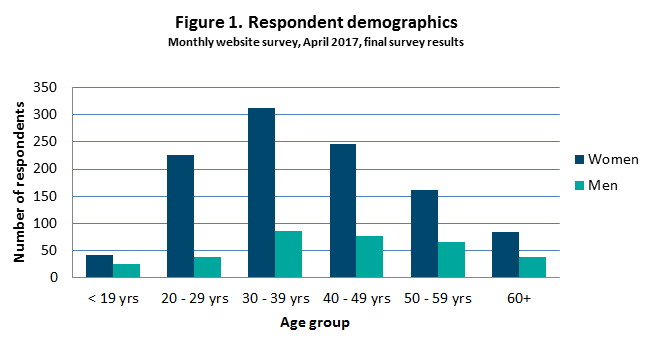
Survey respondents were asked about their own experiences of corporal punishment when they were children. There were no significant differences between the reports of men and women, with four‑fifths (80%) of survey respondents reporting that they were smacked/corporally punished as children (figure 2).
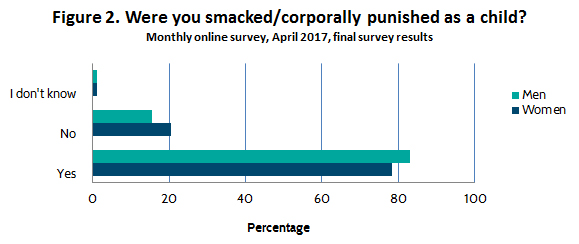
There were also no significant differences between the reports of men and women in regard to smacking/corporally punishing their own children. Of those respondents with children, just over fifty per cent (51%) reported they had smacked/corporally punished their own child (figure 3), lower proportions than those which were reported for the adult responder’s experience of corporal punishment in their childhood.

When asked about the use of instruments when smacking/corporally punishing a child, a substantial majority of survey respondents reported that they did not support this practice. Men (17%) were significantly more likely than women (8%) to report that it was reasonable to use an instrument such as a wooden spoon to smack/corporally punish a child (figure 4).
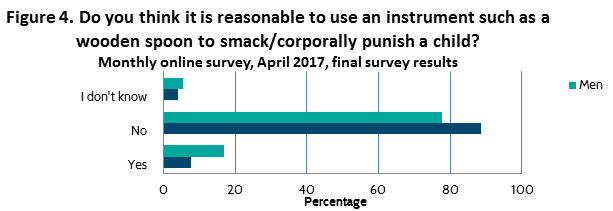
A substantial majority of men and women reported parenting books or their own parents were the most reliable sources of advice on disciplining children. Women were significantly more likely than men to report parenting books (women-40%, men-28%) and friends (women-12%, men-8%) as the most reliable sources of advice. Men were more likely than women (men-36%, women-23%) to report their parents as the most reliable source of advice on disciplining children (figure 5).
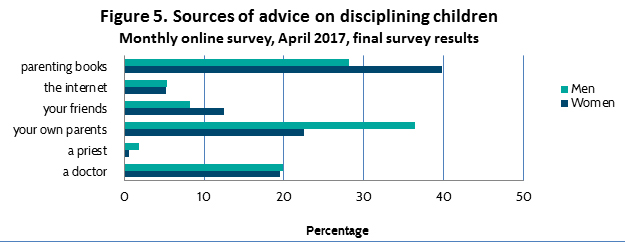
Almost all men and women respondents (96%) did not agree that men and women are justified in occasionally giving each other a smack during an argument. In contrast, when asked whether they would support a ban on all corporal punishment in the home if it meant that parents who occasionally smacked their children would not be prosecuted, there were significant differences between the reports of men and women. Women (59%) were more likely than men (45%) to report that they would support a ban, while a substantial minority (20%) of men and women were undecided whether they would, or would not, support a ban (figure 6).
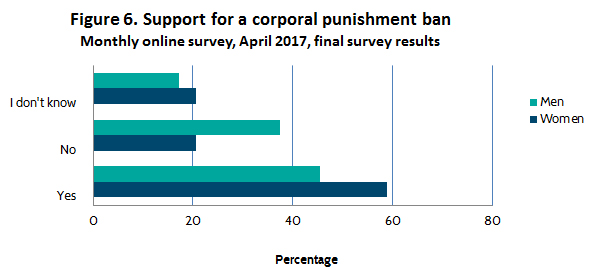
Acknowledgements
Relationships Australia gratefully acknowledges the assistance of A. Poulsen, Australian National University in drafting the questions for April’s online survey.
References
Bourke, J. P. (1981). Bourke’s criminal law: Victoria. Sydney: Butterworths.
CFCA Resource Sheet— March 2014, Corporal punishment: Key issues , available at https://aifs.gov.au/cfca/publications/corporal-punishment-key-issues
CFCA Resource Sheet— March 2017, Corporal punishment: Key issues , available at https://aifs.gov.au/cfca/publications/corporal-punishment-key-issues
Smith, A. B., Gollop, M. M., Taylor, N. J., & Marshall, K. A. (2004). The discipline and guidance of children: A summary of research. Dunedin, NZ: Children’s Issues Centre, University of Otago and the Office of the Children’s Commissioner.